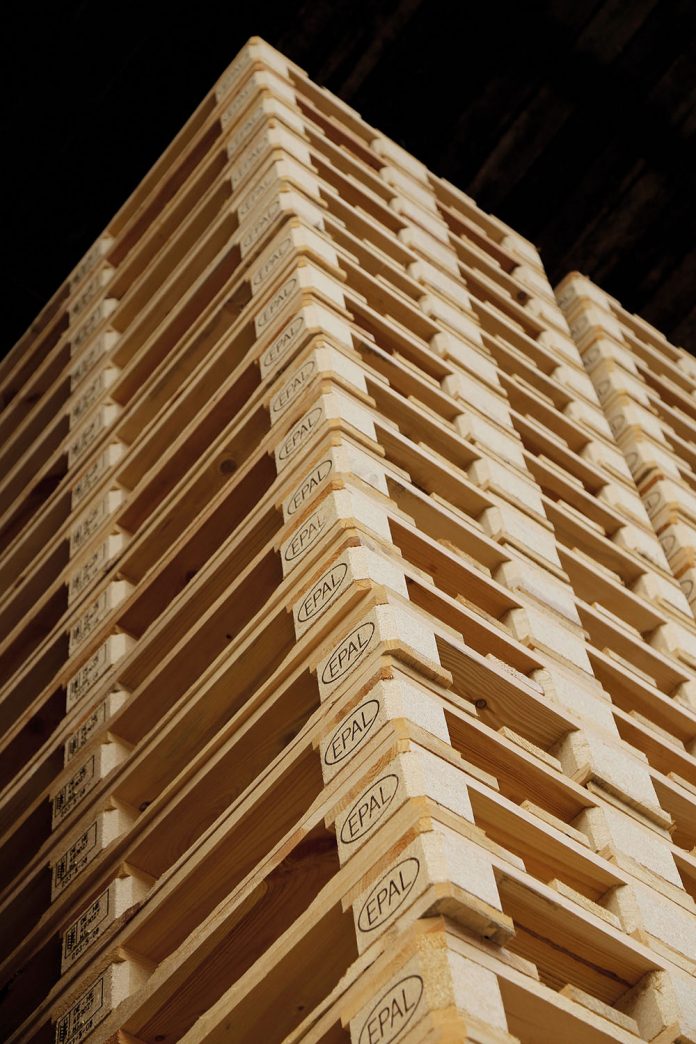To mark EPAL’s 30th anniversary year, Felicity Smith, national secretary for EPAL UK & Ireland, tells us how the pallet – a 60-year-old invention – will form the backbone of the green recovery.
The wooden pallet is 60 years old.
While there are no lavish festivities planned, nor any specific date to hold them on, logistics professionals understand why it is worth celebrating milestones such has those. When you have the responsibility for moving goods between locations wooden pallets have an essential role to play in the process.
Pallets allow products to be batched up, loaded and transported easily and safely, while maximising space and efficiency, saving suppliers and their customers time and money. Pallets made from wood are also the most environmentally friendly and least expensive option. This is why economists have acknowledged pallets as one of the cornerstones of free-flowing international business during the past six decades.
Wood’s low cost, versatility, hygiene credentials and wide availability have helped this material maintain 90 per cent of the UK pallet market for many years. And its superior sustainability is increasingly important to businesses, too.
The environmental credentials of products for companies of all kinds are receiving more attention as governments rebuild their economies in the wake of COVID 19. Principles of reducing, reusing and recycling; cutting emissions and favouring sustainable materials such as wood are becoming central to the policies made in locations including the EU and the US.
Pallets clearly perform well when measured against these core environmental standards.
Reduce
Pallets are made from smaller logs and ‘falling boards’ from the sawmilling process. According to the Timber Packaging & Pallet Confederation (TIMCON), the sector uses around one third of the UK’s timber output, part of a system that sees every part of a sustainably harvest tree used. Sophisticated software packages also help manufacturers design and build pallets to optimal measurements for strength and efficiency.
Repair
Wood makes repair and reconditioning of pallets easy; damaged boards and blocks can be replaced, so pallets can be kept safe and in useful service. This is a simple process that extends the pallet’s lifespan and allows it to be used many times – and often for many years.
Reuse
Truly sustainable businesses must optimise their pallet use before recycling them. According to TIMCON’s annual wood packaging market survey, 48.3 million wooden pallets were repaired in 2019, growth of 5 per cent on the previous year, increasing opportunities for reuse.
Repair is a key part of the pallet pooling model, where pallets are repaired for reuse. In EPAL’s case, the pallets are owned by the owner and repaired to an ‘as new’ specification before being sold on to the new user.
Recycling
When a wooden pallet has become damaged to the point when repair is no longer possible, this is the right time for recycling. Pallets are recycled by industries such as panels and composite block, made into animal bedding, or sent to biomass generators for renewable energy.
There are an estimated three billion wooden pallets in circulation in the UK and EU region combined – with an annual production of around 500 million.
Responsible manufacturers use certified sustainable wood (PEFC or FSC certified sources) to reduce its overall carbon footprint further. In Europe, the packaging and pallet industry uses approximately 20 million cubic metres of this every year. Each pallet stores approximately 27kg of carbon.
Wood is still the least expensive raw material – despite recent market-driven price rises – which will clearly continue to be a decisive factor for many businesses as they realign after the pandemic. However, the above credentials will also make pallets manufactured from wood a key part of the businesses’ strategies to become more sustainable and fulfil their climate obligations in the important months and years ahead.
Wooden pallets in the UK: key facts
- 27kg of carbon (0.9kg in every kg of wood) is stored by a typical wooden pallet
- 48.3 million wooden pallets repaired in 2019, a 5 per cent rise on 2018
- 44.9 million pallets manufactured in 2019
- Every cubic metre of wood reduces the carbon footprint of your business by approximately 2 tonnes
- EPAL UK & Ireland oversees the EPAL open pallet pool in the UK and Ireland region.
- Internationally, EPAL oversees 500 million EPAL Euro pallets and 20 million box pallets, making it the world’s largest open exchange pool.
Wood: a unique status
The UK government acknowledged the unique status of wood in November last year when it released its interim packaging recycling targets for business. Wood was the only material whose target was decreased – from 48 per cent to 35 per cent; the recycling targets were increased for all other materials.










